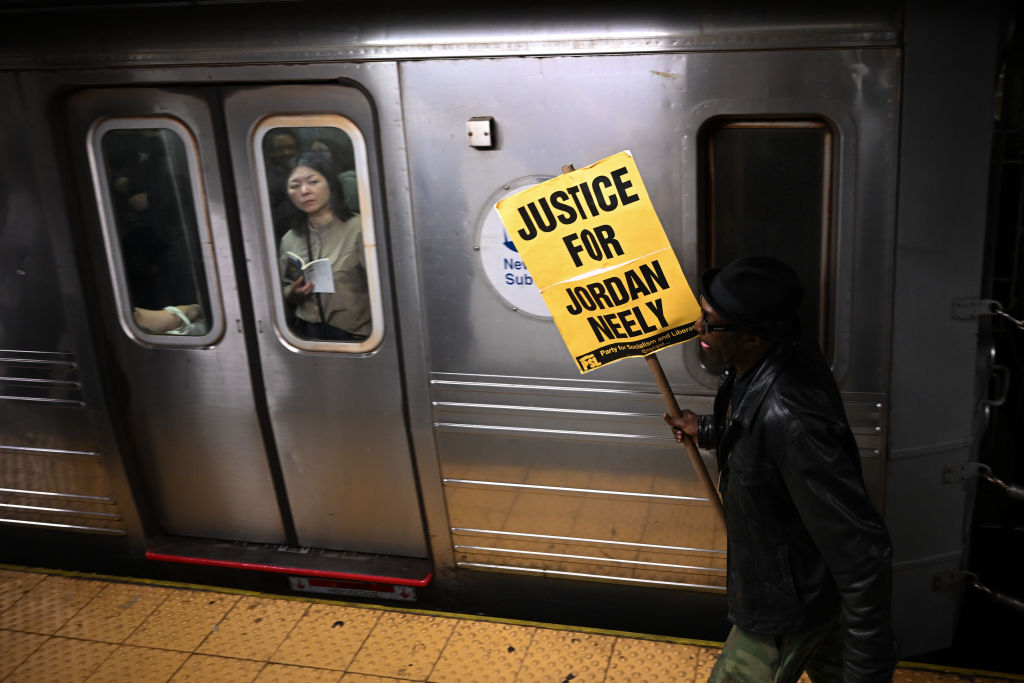The legalists’ logic of proliferating special classes destroys their fantasy of social unity.
About Suffering They Are Always Wrong

Our emotional involvement in remote tragedies is exhausting and pointless.
Here’s what I know about Jordan Neely’s death. He was a homeless black man who frequented the New York City subway system. Over the years, he had dozens of arrests, many of them for violent crimes. Apparently, he sometimes enjoyed impersonating Michael Jackson and dancing for commuters. A few weeks ago, he was being physically aggressive with other passengers. Daniel Penny, a young white man and former Marine riding in the same car, initiated contact with Neely, putting him in a physical position that is sometimes called a “sleeper hold,” which puts pressure on the head and neck, eventually causing the loss of consciousness. According to fellow passengers (who reported being afraid of Neely) and video posted to social media, it seems Neely was in the hold for about 3 minutes. After he was let go, he was unresponsive. Ultimately, he died. Penny has been arrested for manslaughter.
Since then, this event has been a flashpoint in a national debate – no one really agrees what the debate is about, but apparently it was important enough that people who were angry about the circumstances of his death briefly shut down parts of the New York subway. All the people who care about this event believe that it has something to tell us about a larger reality in American life. Some want to paint Neely as a promising young black man gone too soon. In the same way that George Floyd’s death in 2020 earned a thousand hagiographies, the Black-Lives-Matter-types have already sainted Neely as a victim of white racism. Others seem to think that this event tells us something about homelessness. Still others see the inevitable result of the lax approach to crime, policing, and punishment that has obtained since the riots in the wake of Floyd’s death.
But is Neely’s death representative of any “larger truth” about America? Or is it just a single event that serves as a cultural Rorschach test and invites people to leverage what they see to advance preexisting narratives about society? Frankly, I don’t care about what happened with Neely. And unless you know him, know another person involved, or live in New York City, I don’t think you should care either. As national journalists famously said when they refused to cover abortionist Kermit Gosnell’s house of horrors in Philadelphia, Neely’s death is ultimately just a “local crime” story. Who’s the criminal? I don’t care. I don’t live in New York City.
As a Christian, I believe that every life has value. In a cosmic sense, it is a tragedy that Neely is gone. But thousands (millions?) of people die tragically and unjustly every day, all over the world. In a pragmatic sense, I don’t care about their deaths either. I can’t do anything to stop tragic, unjust death, because in large part life is tragic and unjust. If we adopt a broader view that includes all the tragic, unjust death in the world, the fact is that I never hear about 99.999 percent of it. The .001% of it that I do hear about is made up of events that are “newsworthy” – either because the circumstances that attend them are especially extraordinary, or because the particular death in question stands as emblematic of a larger issue of concern.
George Floyd’s story – a black criminal tries to pass off a counterfeit bill, resists arrest, and is (probably) accidentally killed by police – didn’t meet either of these conditions. Floyd’s place in the history books is now certain, but it shouldn’t have been. His memory is only indicative of how a relatively insignificant event became an object of outsized concern, precisely because it was inaccurately presented by media as a larger truth about race in America. Neely’s story – young, troubled black man intimidates people on the subway and encounters the wrong guy – shouldn’t satisfy the minimum criteria for newsworthiness either. As a private citizen living in Houston, I should have never heard about it. The fact that I did – and that so much attention was given to it – illustrates a very unhealthy media environment. Much to the nation’s detriment, this problem plays an enormous role in fueling inaccurate beliefs about the nature of our society.
If you lived in Texas a century ago, it would have been extremely unusual to hear about a murder that happened in New York City. Technological limitations ensured that the news moved slower, and when it did manage to cover great distances, the details were usually scant. Further, there were production costs that came with running a local story about New York crime in Dallas. On the rare occasion that those costs were deemed acceptable, it was because what had happened in New York mattered to the people of Dallas in some practical way. The crimes that Truman Capote documented in his book In Cold Blood were an early modern example of a local story that became a national one. The extraordinary circumstances of the crime made it nationally newsworthy, and its national presence made it worthy of Capote’s attention. Something similar occurred with Norman Mailer’s treatment of Gary Gilmore’s story in The Executioner’s Song.
Readers might be glad that we live in the Information Age, where news moves fast and details are abundant and lurid. But the making-present of distant suffering has had catastrophic effects for civic life. Mass shootings serve as an excellent example. ABC News breathlessly (and erroneously) reports that the United States has had more mass shootings in 2023 than we have had days in the year. What is the purpose of this report? To make it seem like everyone is at risk, everywhere in America. Why? Because fear, too, is a powerful motivating factor when it comes to political action, and the corporate media wants to revise (or eliminate) the Second Amendment. Meanwhile, your chances of being present at a mass shooting remain on par with your odds of a major lottery win. But this fear-mongering changes how people live their lives: my university has tourniquet stations every few hundred feet all over campus, just in case we have a mass shooting. In turn, this creates a perception in students and faculty that they are at-risk. And, of course, that is precisely the point.
Today, our phones and computers give us an intimate look at all the suffering in the world. A century ago, you had to mentally process the suffering of you, your family, and the people in your town. Today, the average person in Boise has to process his own suffering, the suffering in California, the suffering in New York, the suffering in the Uyghur camps, the suffering at the border, the suffering of people who were “misgendered,” the suffering of “disenfranchised voters,” the suffering of the Syrian children, the suffering of the Indonesian Christians, and the suffering of the “slut-shamed.” No wonder so many are depressed.
Psychologically speaking, human beings aren’t meant to carry the burden of the suffering of the world – there is enough of it close at hand. And yet, the unholy alliance of modern technology and politicized media ensures that you are force-fed the world’s suffering in graphic detail. Even worse, because most of that suffering is distant, we as spectators have no way to offer any immediate relief. This means that in addition to the empathy and pity that you feel on behalf of the sufferers, you also get to feel the guilt and helplessness that comes with the knowledge that you can do nothing.
We have now become conditioned to believe that the meaning of being a good person is to be troubled by distant suffering, and motivated to address it. That’s why many readers who have reached the end of this essay are still fuming that I said we shouldn’t care about Neely’s death. It’s not that it isn’t a tragedy. It’s just that it’s a tragedy that doesn’t accurately represent any truth about my world or yours. Choosing to believe otherwise might seem noble, but it actually creates moretragedy and suffering. The secondary suffering that it brings is the suffering that you feel from anger at injustice and from your helplessness in the face of it. The tragedy, of course, is that these feelings modify the way you inhabit the world, and not for the better. Wherever possible, we should liberate ourselves from the demands of distant suffering. We can achieve this by refusing to be spectators, and refusing to allow the illusion of immediacy to change how we live. Sufficient for the day is its own trouble. If we can learn that lesson, we might be able to live again in the reality that exists—rather than the one ideologues and media grifters would curate for us.
The American Mind presents a range of perspectives. Views are writers’ own and do not necessarily represent those of The Claremont Institute.
The American Mind is a publication of the Claremont Institute, a non-profit 501(c)(3) organization, dedicated to restoring the principles of the American Founding to their rightful, preeminent authority in our national life. Interested in supporting our work? Gifts to the Claremont Institute are tax-deductible.
1964 was not the end of racial history.
Retake Main Street or prepare to be homeless.



